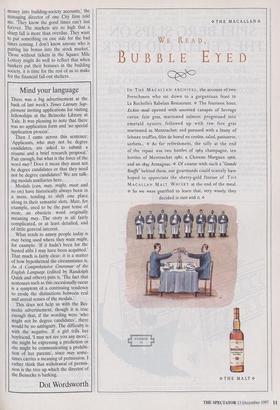Mind your language
There was a big advertisement at the back of last week's Times Literary Sup- plement inviting applications for visiting fellowships at the Beinecke Library at Yale. It was pleasing to note that there was no application form and 'no special application process'.
Then I came across this sentence: 'Applicants, who may not be degree candidates, are asked to submit a résumé and a brief research proposal.' Fair enough, but what is the force of the word may? Does it mean they must not be degree candidates or that they need not be degree candidates? We are talk- ing modals auxiliaries here.
Modals (can, may, might, must and so on) have historically always been in a mess, tending to shift one place along in their semantic slots. Must, for example, used to be the past tense of mote, an obsolete word originally meaning may. The story is all fairly complicated, or at least detailed, and of little general interest.
What tends to annoy people today is may being used where they want might, for example: 'If it hadn't been for the busted alibi I may have been acquitted.' That much is fairly clear; it is a matter of how hypothetical the circumstance is. As A Comprehensive Grammar of the English Language (edited by Randolph Quirk and others) puts it, 'The fact that sentences such as this occasionally occur is a symptom of a continuing tendency to erode the distinctions between real and unreal senses of the modals.'
This does not help us with the Bei- necke advertisement, though it is true enough that, if the wording were 'who might not be degree candidates', there would be no ambiguity. The difficulty is with the negative. If a girl tells her boyfriend, 'I may not see you any more', she might be expressing a prediction or she might be communicating a prohibi- tion of her parents', since may some- times carries a meaning of permission. I rather think that withdrawal of permis- sion is the tree up which the director of the Beinecke is barking.
Dot Wordsworth


















































































 Previous page
Previous page